On the sidewalk in front of the Eastside Café in the Los Angeles neighborhood of El Sereno, canopies are set up boasting colorful artisanal goods. Sound check is underway for a lineup of local bands and poets. Puestos are built selling aguas frescas, tacos, and esquites. Angela Flores, a co-founder of this community space, waves at a little girl running around with a purple balloon. It’s “La Gente Resiste,” the third installment of fundraisers meant to collectively raise money for this community and cultural space that was recently close to being a casualty of gentrification.
Eastside Café is a 15-year-old space guided by Angela Flores and her father Roberto Flores, along with 10 + collectives. They provide everything from Son jarocho and self-defense classes to anti-gentrification and ESL workshops, on a pay-what-you-can basis. “There’s a lot of classroom time but on weekends its more workshops and cultural events,” says Angela Flores.
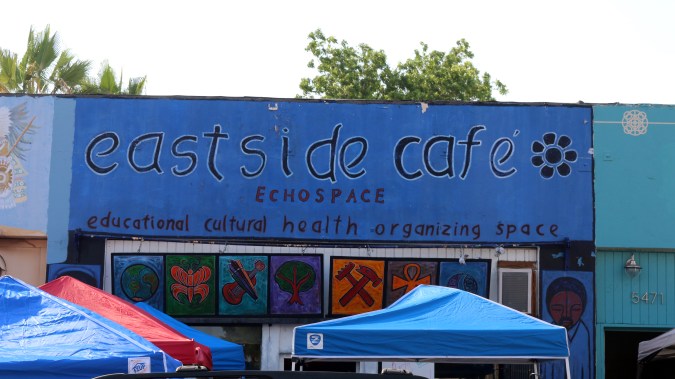
The Flores family attributes the ideals embodied in the space to their connection with the Zapatista indigenous liberation movement in Chiapas, Mexico. “We are a multi-disciplinary space, Zapatista-inspired, co-facilitated by community members, and we believe that autonomy is key in being able to empower ourselves,” Angela explains.
Flores started the cafe in her house, gathering like-minded folks to have platicas about the injustices their community was facing. Eventually, the group decided to transition their focus from healing to action, in order to address these issues head on. This meant finding a physical space to provide diverse programming that benefits the surrounding community.
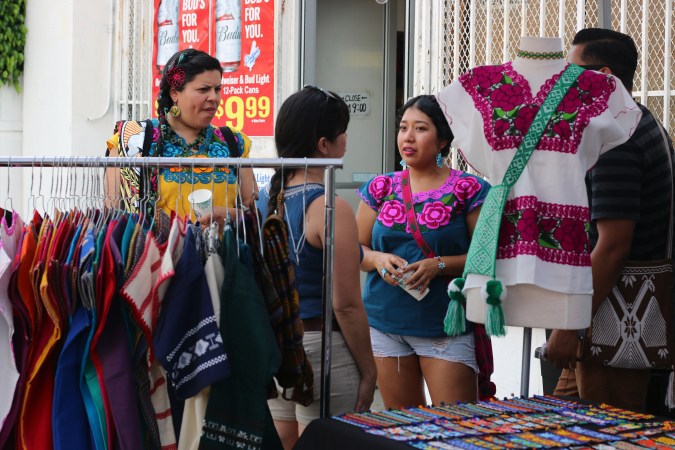
In establishing the cafe’s ethos, Angela was greatly influenced by her activist/professor father Roberto, whose history includes working in the fields of Oxnard as a child, receiving a Ph.D. in education from USC, organizing with farm workers, and studying with the Zapatistas during their most contentious time in the early 90s.
Her brother, Quetzal Flores, (of the world-renowned band Quetzal), and her father were part of the organizing group that led 30+ Chicanx activists and artists to Chiapas for the Chican@ Zapatista Encuentro in 1997. That summer, filled with conversation and art creation, sparked crucial discussions on autonomy and art as a tool to build community and resist.
“I think a lot of Chicanos really resonated with that message of peace and communication. Zapatistas are masters in communication and they were successful in speaking up and rising up against their government and reclaiming their land,” says Angela Flores.
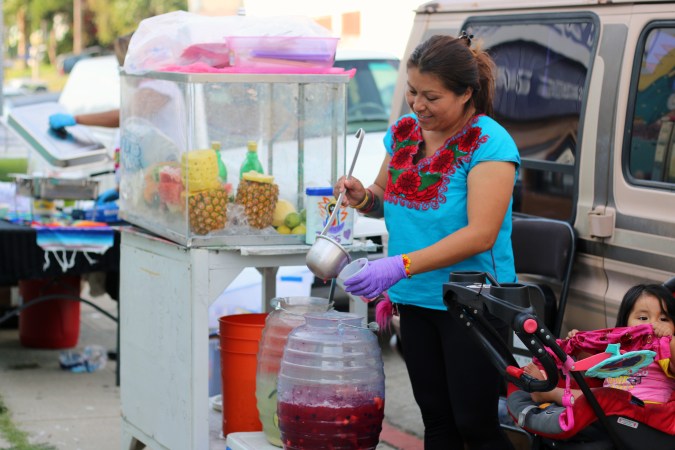
This moment in time was also significant in the creation of Eastside Café’s mission; one of combating oppressive neo-colonist systems like gentrification and strengthening community ties through a non-hierarchical model.
“They’ve [Zapatistas] set up another type of economy, an autonomous moral economy and a collective and cooperative economy. Every community is in charge and decisions get made horizontally. And horizontality is very important for us,” explains Roberto Flores.
A Veracruz-style fandango was held on Día de Muertos of 2004 to celebrate the opening of the cafe. The Afro-diasporic, indigenous, and Spanish sounds of son jarocho filled the space—an appropriate way to convey how the space would be entrenched in honoring its roots and empowering people through communal bonding and artistic resources.
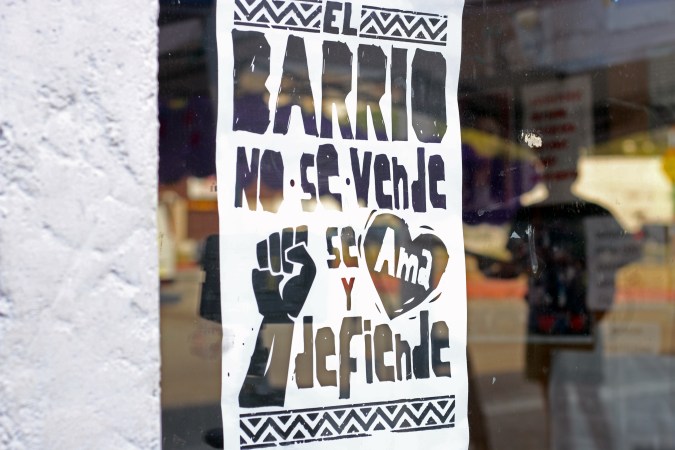
Angela Flores activates a horizontal power structure at the Eastside Café not only by making decisions collectively but also by using the resources already present in the community through something she calls “asset based assessment.” “If someone’s a plumber, if someone’s a carpenter, if someone’s really good at gardening, we can hit them up and we could do something like a barter exchange or a time bank where we can have that type of DIY spirit. More and more we have to rely on each other, it means being interdependent too,” she explains.
But soon enough, gentrification came knocking at the door. Eastside Café’s landlord was in the process of selling the land where the establishment stands. Refusing to allow gentrifying forces to change the dynamics of the community, the collectives gathered, strategized and were present for the inspection with the soon-to-be owner. They presented themselves and their work. “I couldn’t believe the words were coming out of my mouth. I pretty much told him ‘we are asking you to drop the deal because we’ve invested so much work here so much sweat, equity and it belongs to us,” describes Angela Flores.
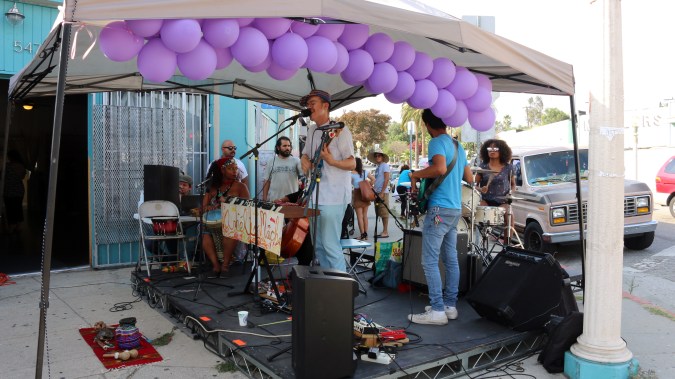
After diligently protesting the potential buyer, he finally caved and on May 4th negotiated a proposition: they had 10 days to come up with a bonafide offer and he would drop his offer. By this point, the cafe had successfully found angel funders in musicians Aloe Blacc and Maya Jupiter, and soon found a non-profit to be a fiscal sponsor. They received additional funding through their GoFundMe campaign and by May 18th they were in escrow.
This was a significant win for autonomous spaces, an example that it is possible to reclaim land and successfully fight gentrification. “What is the opposite of colonization? It’s grounding ourselves, rooting ourselves here, letting people know that we are here, we are here to stay, aqui estamos y no nos vamos,” says Angela Flores.
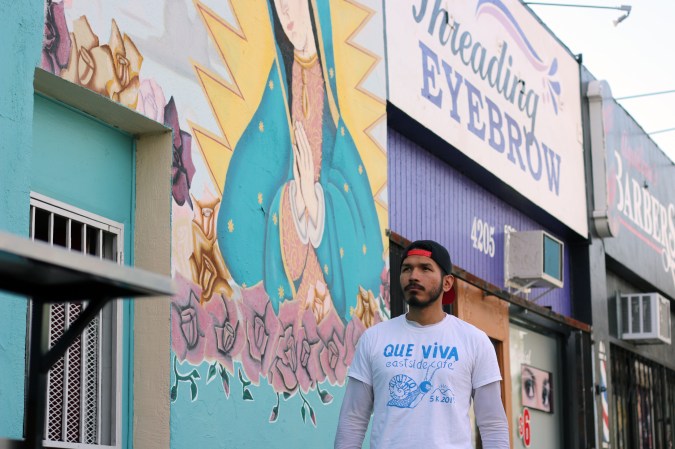
The cafe refuses to call themselves landlords – they prefer the term land guardians to be more in line with their values of collective ownership and horizontality. “This building doesn’t belong to one person. It belongs to everyone in the community and that’s what autonomy is, when the people can come together independently without the help of city council, without the help of the state and be able to determine their own destiny, determine what’s going to happen to their children in the future,” explains Roberto Flores.
In line with ideals of self-determination and cooperative decision-making, Roberto Flores sees the cafe as a way of fighting against capitalist forces that seek to break up communities. “We are re-sewing our community fabric, because it’s gotten tattered and torn by capitalism and these notions of individualism. So what we are doing is bringing people together to get to know each other as neighbors and help each other out.”
Eastside Café will keep their GoFundMe campaign active in order to decrease the mortgage, allowing them to keep rents low for neighboring businesses that operate in the same building. This further ensures they don’t contribute to gentrification.
The successful purchase of the building and the shared mission to provide a space for free cultural expression and learning is a powerful example of resistance. As the city of Los Angeles faces increasing threats of gentrification – many of which have centered in Latino communities – Eastside Café’s collective ownership stands a shining example of what can be achieved.




